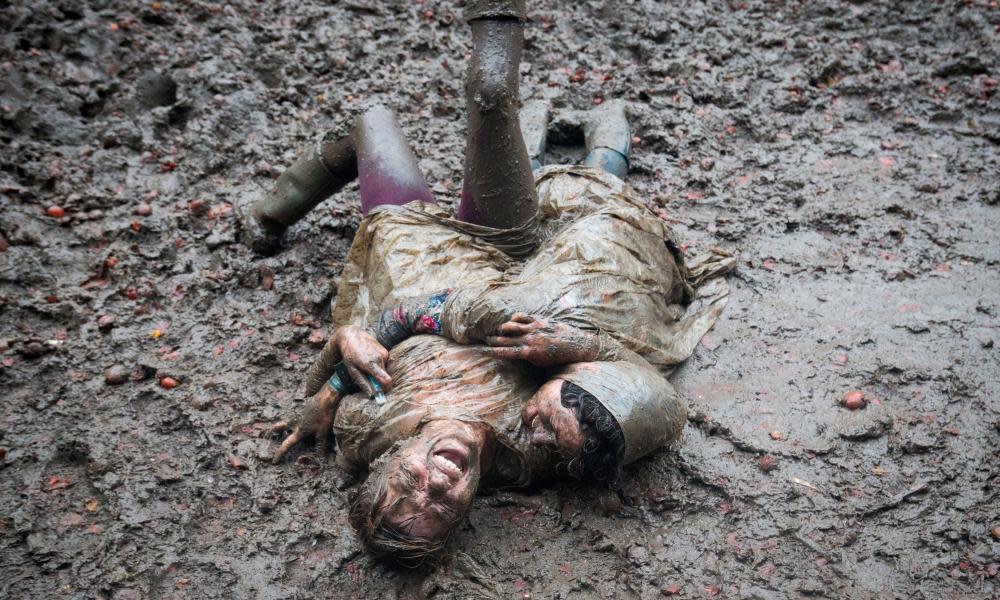The joy of missing Glastonbury, and other poignant lockdown pleasures

For those of us with fond personal memories of the Glastonbury festival – or as Mick Jagger put it in our pages last week, the “alternate Ascot” – the news that it wasn’t going ahead in 2020 was a blow.
It has been seven years since I last attended to witness a rare and mind-meltingly good Portishead appearance and, like everyone else, to become more mud than man. But I’d since grown used to watching it on television – not just for the music, but also as one of many ways to mark the passage of time.
One intangible loss for many of us during the pandemic has been the ability to break up our lives – with trips, weddings, nights out – to provide shape and contrast. Without contrast, there’s no story. And without story, life can feel meaningless.
As ever, however, there is an upside for Glastonbury, and for us: not just the opportunity for an (admittedly unscheduled) fallow year for Glastonbury to allow the pastureland to heal and the locals and organisers to take a break. But for a chance to pause and revisit some of the greatest moments of the festival: in other words, to appreciate what we have, not just what hasn’t yet happened.
In the same vein, had most professional sport not been on hold, I might never have been gripped by The Last Dance, the frequently jaw-dropping story of Michael Jordan’s unique ability to change the reality not just of 1990s basketball and occasionally physics, but of global culture.
Indeed, culture during the pandemic has been flourishing in unexpected ways:
• The Nigerian TikTok star who has made punning into an art form
• The video game breaking LGBTQ barriers
• The Parisian jazz bar whose gigs for a solo audience have reduced people to tears
• The orchestras of a ‘Mozart size’ that will play the Royal Albert Hall for the Proms
• A filmed version of Hamilton, the musical you might otherwise never have gotten tickets to see
• The homemade films by top directors and big Hollywood stars
Lucky numbers
9 – the name for a planet in our solar system, replacing Pluto, that scientists hope to discover with a new telescope
90 – the percentage of Uganda’s rural population that could be helped by a new stove that would allow them to reduce deforestation
What we heard
That article really hit a nerve, in fact. Among the many stove-related responses we received, Paul Mburu Douglas wrote:
Would it be possible to highlight the use of solar cookers as a really viable option for people to use as an alternative to using firewood, and also encourage people to come up with ideas on how to improve the quality of the cookers? I think solar cookers are under-reported
Kevin McLean, president of Sun24, wrote:
May I suggest writing an article about rock beds in traditional open-fire cookstoves? Extensive testing by SNV has confirmed findings in the field that placing a bed of rocks in three-stone cookstoves, for example, improves efficiency by a third. A third less firewood, a third less time collecting firewood, more than a third less smoke and a third less climate damage.
And Martin Morgan suggested:
One subject that kills two (very important) birds with one stone is provision of bio-digesters and stoves that utilise the resultant gas. [There are] many different types, but a rudimentary one is a double skinned vessel with the gap filled with water. Kitchen waste, animal dung - even human waste goes in the centre. A floating cap goes on the water, and a tube collects the gas from the rotting waste that is used for cooking. Win-win! Waste that causes disease is trapped and sealed, and less fuel wood is used, lessening deforestation – and the resultant compost/slurry is safe to go on crops. I’m surprised the model isn’t used more often.
Where was the Upside?
• In the one region of Russia to say “nyet” to Putin’s allegedly rigged referendum allowing him to hold on to power until 2036.
“We held flashmobs every day, stood in solitary pickets, and on Saturdays we’d do protests driving in our cars, all so that our district authorities and deputies would hear us,” Bondareva said.
• And in Cronk – the mildly alcoholic sarsaparilla-related drink advertised in 19th-century newspapers with lines such as “Buy Cronk”, “Cronk is good” and “Cronk is the drink”. They have inspired a Canadian brewer, Paul Fairie, to recreate it from scratch.
The drink hasn’t even been tasted yet, but demand, Fairie says, is already huge: “Cronk rules everything around me.”

 Yahoo News
Yahoo News 
